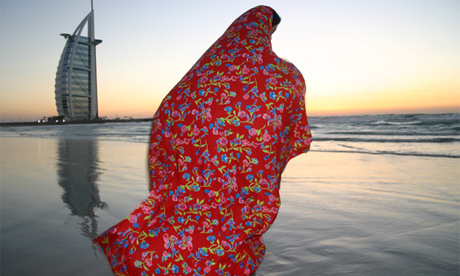Grappling with Culture, Art and
Identification/Iranian: Artist Haleh Anvari
In an interview with the UK Guardian journalist, Natalie Hanman talked to Haleh Anvari about how her photographs of women in brightly colored chadors attempt to redraw the image of Iran in the west. Speaking of her past, Haleh tells of pushing the limits too far and being confined to her house, in frustration she picked up a camera and started a new career as a photographer and artist.
 |
| The Photography of Haleh Anvari Iranian Artist from google image for educational purposes only |
Haleh grew up a Shia Muslim and is 46 years old. She went to an English boarding school and went on to study at Stafforshire University. She returned to Iran in 1992 and married. Then came great changes to Iran, it was a time of turmoil and violence. The hijab was made compulsory for women if they were in public and black was considered more desirable than other colors.
Anvari grew up in a family that wore the chadori, and it was considered an act of entering adulthood to begin wearing a chadori after ones youth. But in her family women wore different colors of dress and that gave her a more liberal view. Growing up in what she calls "a chadori family", she explained it is where women wore the chador "to enter the world".
 |
| from google image for educational purposes only |
She goes on to say, in the article, that Iranians are well known for having a double life, outside and inside. She points our Iran's architecture and language show it in many ways. In a one woman photographic showing and conversation she discusses how the West has eroded the complexities of the relationship of the culture and dress. In her view a black hijab has become almost like short hand in the way the West views Middle Eastern women.
Reading the article gave me more insight than I think I have ever had about the complex feelings Iranian and other Middle Eastern women have about wearing a hijab or chador. In my Western women's view I only saw it as restrictive and a symbol of enslavement for women. It is so interesting to hear the voices of Muslim women. I am sure the feelings are diverse and not of one view. It is a conversation worth listening to and understanding. But without the ability to speak up and have a platform Anvari's voice would never have been heard. We must thank her and the many women who are speaking up in words, art and photography to let us see into their worlds.
No comments:
Post a Comment